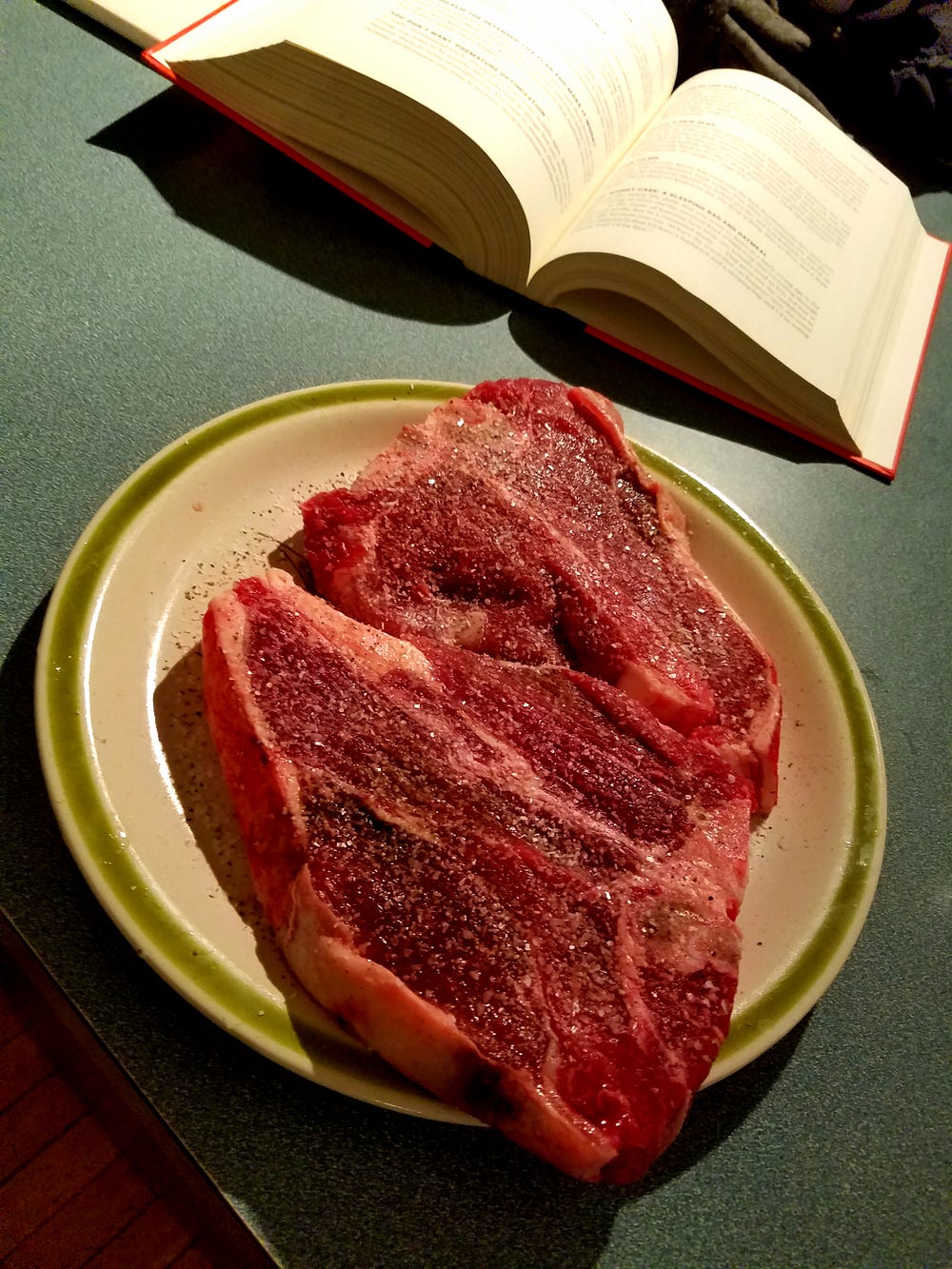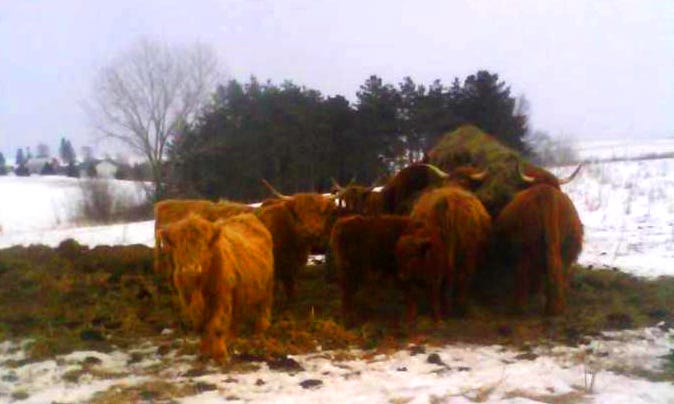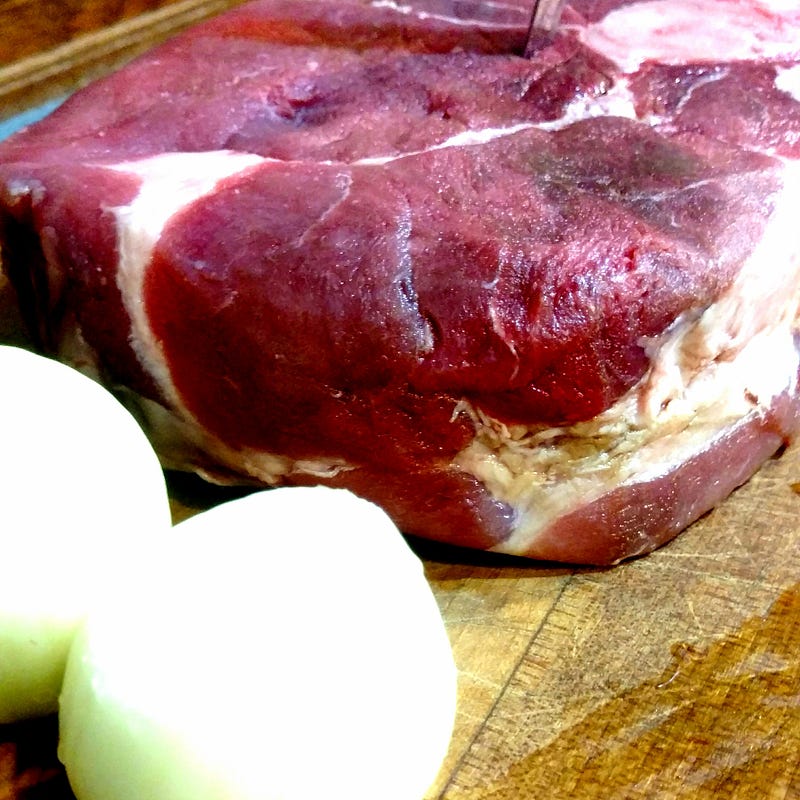Probably the most vegan item you can buy in the supermarket is a pound of grass-fed beef.
I was thinking about that heretical idea as I drove through my neighboring countryside, scanning empty cornfields for signs of life and wondering at the hubris of mankind. When did we decide that we can own all the lands of the Earth and use every square inch of it for our own needs? About 10,000 years ago, actually, when we invented the idea of agriculture.
Sadly, in the practice of agriculture it is impossible to not cause endless suffering to many living creatures. The most suffering of all is caused by annual agriculture, the cultivation of vegetables, including grains, beans, and rice, that only take one year to grow from seed to food. We displace countless wild animals from their homes and lands when we cultivate crops. Not only that, we also kill thousands of creatures when we till the soil.
I meditated on the empty corn fields for hours. In the end, what it represents is a graveyard for all wildlife, from the invertebrate worm to the feathery bird. The entire wild ecosystem of endless acres is completely interrupted by the tillage of all arable land.
About 400 million acres in the US alone is used to grow crops, which is about 40% of all US land.
This of course feeds us our daily meals, but it takes away the daily meals of billions of animals, as well as destroying their homes, families, hunting grounds, and so on. Not to mention the terrible slave-like conditions that many farm workers in the field are subjected to. Humans are animals as well.
See, I don’t believe in any way that a vegan diet actually causes less suffering in the long run then any other diet. All annual agriculture provides fertile ground for the casual extermination of hundreds of species of animals on a yearly basis.
That is why, in truth, a pound of grass-fed beef accounts for less suffering per capita then a pound of corn.
We are all looking at the problem of food morality through the wrong lens.
We think ”I need a moral framework on which to hang my hat and proudly proclaim myself this or that in order to feel like I am not a bad person.” Instead of clustering around that flawed outlook, I want to encourage us all, as a farmer and outdoorsman, to except the fact that life feeds on life, and began the healing process, the regeneration of spirit, by respecting the life energy that resides in everything that we eat.
We should respect the life energy in everything that we consume, from the tree for firewood to the petroleum to fuel our car, both the accumulated energy of ancient sunlight captured by perennial plants.
We exploit life energy endlessly, day after day, in various and sundry ways, including driving our cars on tarred roads and turning on our plastic phones to surf the internet, all of which is powered by the dark black blood of dead trees.
Veganism is a laudable idea, but for some it provides a framework for moral superiority. Cultivating a savior complex is a natural result of following any ideological cause, and life is then seen through a framework that excludes anything that doesn’t fit into that ideology. And the reality is that we all consume life energy, endlessly.
If the primary goal of veganism is to reduce suffering, then many of us are vegan, and a diet composed of primarily grass-fed beef and dairy, as well as free-range chicken eggs and perennial plants products, is the most vegan diet that there is.
We need to examine our relationship to land and the life energy it contains. In the early 1900s farmers knew that to keep the land in good tilth, which meant healthy and productive, they needed to let their fields go fallow. The idea that a piece of land is worthless of it is wild is prevalent in our society, and the idea of land allowed to go fallow is anathema.
In our modern society we feel that all things should at all times be as productive as possible.
But the funny apart of the term fallow was that it didn’t mean that the land was actually resting. No, what it meant was that the farmer was not coercing the land into productivity with a blade and an engine. When allowed to fall back into fallowness, the land itself bursts forth with wild life and energy beyond what is possible with an annual agriculture. The life stories of a million creatures play out and contribute to the regeneration of a piece of fallow land, a wild acre, a small part of planet Earth.
Our current framing of the food production problem is this: We need to utilize annual agriculture as heavily as possible in order to feed the population. As farmers, our mode is “boom or bust”. We don’t think we can spend 10 years to consciously design a perennial animal-based agriculture, because we need cash right now.
So what is really anti-vegan, what really harms animals, is this idea — that we need to produce annual crops on every square inch of land, creating a wildlife graveyard on 40% of America’s land in order to feed our endless hunger.
When we get right down to brass tacks, I don’t think that the majority of the people on the planet really understand what it takes to grow our own food. And this disconnection plays out across urban centers all around the globe, where people make a thousand choices trying to do the best they can with the panoply of annual agriculture products available.
Cheap food is killing our connection to the landscape.
More people on the planet means more resources being extracted from the earth, regardless of whether or not we are vegan. Avocado producing countries are feeling the avocado squeeze because of American’s high demand for guacamole. Acres of rainforest are being bulldozed to plant more avocado trees. Demand is so high that Mexico, which produces about half of the world’s supply, is thinking about importing avocados, while an average Mexican can’t even afford to buy them to eat.
All this to say, having your vegan raw food avocado chocolate cake isn’t as harmless as you may think.
If we really do take a true audit of the death and destruction our lifestyles wreak upon he natural world, we would all be surprised. We all live a trail of devastation as we go through each day, because all life consumes life in order to thrive- -this is the natural way of things, as far as I know. Is your plastic fleece hoodie so innocent, and is your root vegetable lunch so kind to the earth?
All root vegetables have to be planted in tilled land — how many deaths occurred when the land was tilled? Weeded? Cultivated? And finally, all root vegetables have to be dug up and the land prepared for next years crop.
When you wash your fleece in your washing machine, microbeads of plastic flow into your waste stream, and ultimately down into rivers and out into the sea, causing serious health problems for marine life.
What is important right now is to focus on gaining perspective on the larger, overarching issue that have as a society: We do not respect the life force.
Modern man just doesn’t respect the life that resides in all things, and is consciously and with much deliberation consuming all the useful energy until nature, the planet, is completely out of balance.
The planet will recover one way or another. But that Earth’s healing process may not include us if we do not choose to live more consciously.
And I certainly don’t think that means going vegan.
What it means is cultivating a real relationship with your food, for one thing. Eating locally will always trump any dietary morality play. When we eat locally, we create a relationship with the food that we put in our mouths every day. This relationship is like any other relationship, it needs work and care.
As Michael Pollan advocates, skip all the bullshit foods in the middle of the supermarket, all the packaged nonsense that is 90% corn-based. Corn-based foods are the least vegan foods you can purchase. They contain the most externalized suffering of any food group that I can imagine other then sugar, the other main ingredient on most of that packaged-foods garbage.
Instead of any packaged garbage, stock up on meats, vegetables, dairy, eggs, and all other whole foods. Just start there. Then search out your local farmers and purchase whole foods directly. Cultivate real relationships, in one way or another.
That is the only way to begin the real healing process.
We can reduce suffering on the planet by consciously entering into a relationship with the land, the people that live on the land, and the plants and animals that we consume.




No hay comentarios:
Publicar un comentario